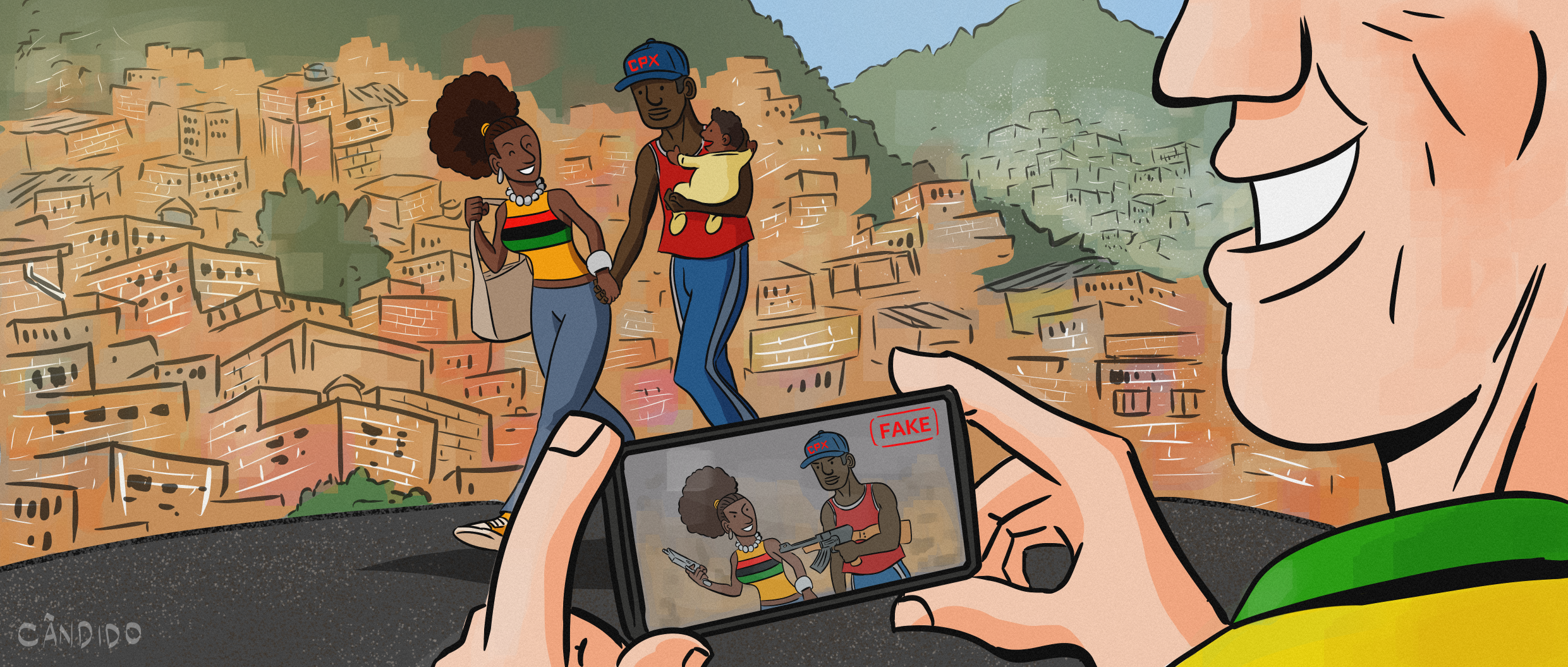
The criminalization of poverty is not a new phenomenon. It presents as a manifestation of prejudice, xenophobia, racism, classism, and social discrimination that exists around the world, towards our most vulnerable. This phenomenon is increasingly present in digital spaces in Brazil, which is ranked third for highest average time spent on social media.
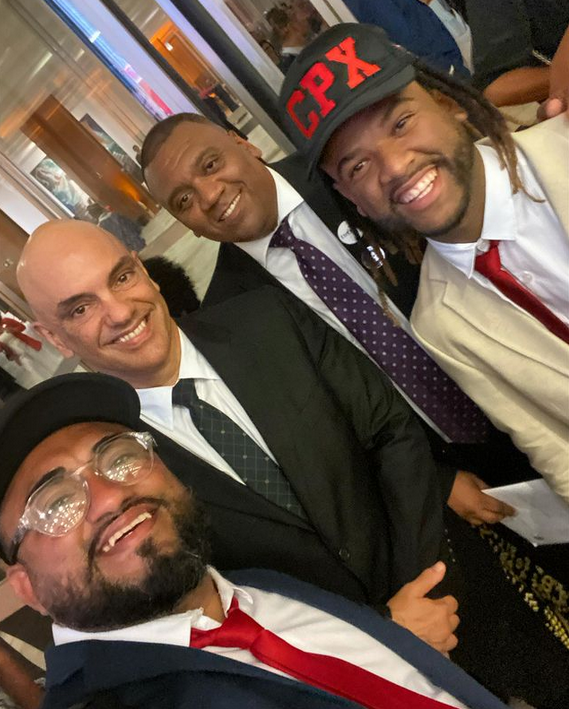
A recent case involved human rights activist Raull Santiago—member of the Straight Talk Collective and Movimentos, and resident of the favelas of Complexo do Alemão in Rio’s North Zone. He was a victim of numerous fake news stories that began to circulate when presidential candidate Luiz Inácio Lula da Silva visited Complexo do Alemão and continued on inauguration day in Brasília.
“I was at a dinner at the [presidential] Itamaraty Palace, alongside ministers, famous people, people from around the world and among them, Supreme Court Justice Alexandre de Moraes. I took a selfie with him alongside Rene Silva and Preto Zezé from [Brazil’s largest favela organization] CUFA, which I later posted on Instagram. It instantly went viral with people saying Alexandre de Moraes had taken pictures with the criminal faction PCC during the inauguration dinner.” — Raull Santiago
The lie associated award-winning favela community organizers—all Black men, two from Rio and one from the state of Ceará, recognized internationally for their dedication to strengthening and improving their communities—with drug trafficking in São Paulo. People born, raised, and living in favelas and the urban periphery have always been victims of the criminalization of poverty through police accounts, court proceedings, and traditional media reporting. But now, with Brazil hyper connected through social media, they have also become targets of criminalizing misinformation, strategically produced to “kill” reputations like a rifle shot, in the form of fake news.
According to research carried out by digital marketing agency Sortlist, Brazilians spend an average of ten hours and eight minutes on the Internet per day, including both work and leisure time, which amounts to 154 days per year. The report Digital 2022 highlights Brazilians’ online presence, showing there are close to 171.5 million social media users in Brazil. Using data collected in January 2022, the report reveals that 79.9% of Brazilians use social media in their daily lives.
Brazilians love social media, which is a space where the criminalization of poverty and racism have become even more ubiquitous and problematic, increasingly influencing society. Such as with the police’s inappropriate use of social media images of innocent Black men—with no suspicion, investigation, proof, conviction, or even sentence—in physical albums for facial recognition at police stations. This leads to innocent people being wrongly identified and unjustly detained.
This digital criminalization of poverty through fake news, be it through images, edited videos, false information, or forged and edited audio, encourages a trial by social media, reproducing political violence. This is the opinion held by Maria Tranjan—coordinator of the Protection and Democratic Participation area of the human rights organization ARTICLE 19 and representative of the Journalists and Communicators’ Protection Network. She explains that the phenomenon of political violence on social media in Brazil extends beyond violent incidents targeting politicians or electoral candidates:
“A big part of the field considers that only candidates/elected politicians experience this form of political violence. But we [from ARTICLE 19] understand that when violence against communicators has a political nature and is motivated by political positioning or coverage, it is also a form of political violence… If we don’t consider incidents that are not directly related to elected politicians facing violence, we disregard cases for example, of a journalist receiving threats for certain political coverage, or ones such as Mestre Moa‘s, who was brutally murdered in 2018 by a Bolsonaro supporter. We need to understand that politics also affects (and is affected by) these people, who have their public life and freedom of expression targeted.”
According to the guide Political and Electoral Violence in Brazil produced by Brazilian NGOs Land of Rights and Global Justice, political violence can be understood as “physical acts of psychological intimidation or discrimination, aggressions, hate speech, and offensive content against historically discriminated groups, especially elected politicians, candidates, pre-candidates, or those appointed to public or political representation roles, aiming to suspend, interrupt, restrict, or destabilize their free and full exercise of political representation and participation.”
ARTICLE 19 and 42 other civil society and social movement entities make up the Brazilian Committee of Human Rights Defenders (CBDDH), that launched the practical guide Protection Against Political Violence for Human Rights Defenders during the 2022 elections, in response to the increase in recorded political violence cases.
Criminalization of Favela Activists on Social Media
Seven days after the first incidence of Santiago and Silva’s picture being used on social media posts of fake news online, new misinformation and lies were spread on Telegram, WhatsApp, Twitter, TikTok, and Instagram groups. According to Santiago, the majority incited hate and violence against the community leaders, who were once again associated with drug trafficking via fake news linked to former president Jair Bolsonaro.
This time, the political violence happened following the January 8 invasion and vandalism of the Supreme Court, Federal Senate, and Chamber of Deputies in the Three Powers Plaza in Brasília by those who did not accept the presidential election results.
Following the federal intervention enacted by President Lula in the capital, that resulted in the arrest of thousands of “patriots” taking part in these far-right acts, these groups began spreading fake news on social media in an attempt to distance themselves from the crimes committed. They created a narrative that infiltrators like Santiago had supposedly gone into the midst of the “patriotic parades” to commit the crimes and vilify them. The use of fake news is common with far-right groups to promote a cultural war of narrative disputes.
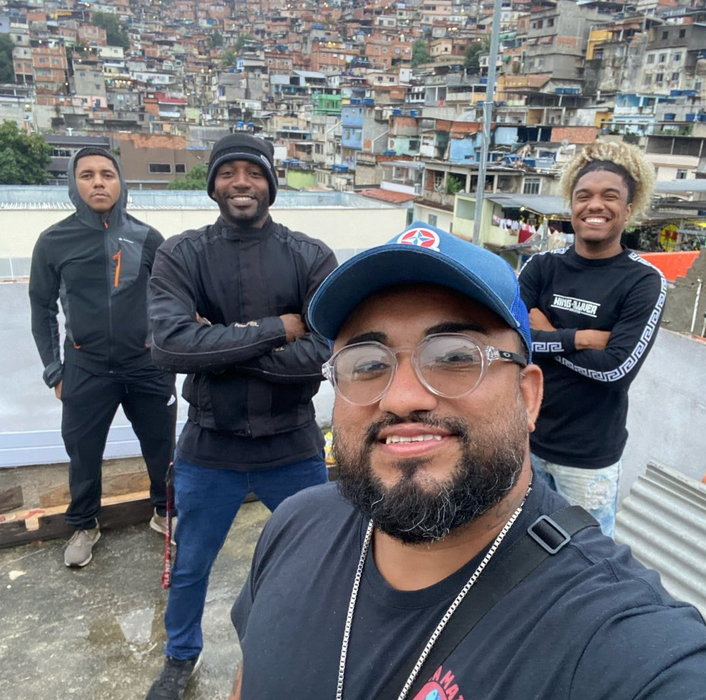
One of the key photos used for misinformation has Santiago on a rooftop in Complexo do Alemão, where he lives and works managing various social projects. In the picture, he stands beside his friends Anthony Benné, Rildo Riele, and Tiago da Purificação—three young Black men and social entrepreneurs. They were accused of forming a “gang” to vandalize public buildings in Brasília on January 8.
Santiago vents: “My friend Tiago da Purificação, for example, had never been to Brasília until we went on January 1 and came back on January 2, and Anthony Brenné and Rildo Riele have never even been to Brasília. But the fake news makes out as if we were all there participating in that madness.” He says that as well as fearing physical violence, his friends also lost out on two ad campaigns because of the negative image that had become associated with them. These fake news stories not only destroy reputations, but also the livelihoods of these young victims, once again facing the consequences of systems that perpetuate inequality and racism in Brazil.
This led them to create an Instagram profile @osinfiltradoscpx to reclaim their own narratives. In the description, they explain a bit about who they are: “Falsely accused of infiltrating Brasília during the invasion on January 8, here they show their routines, personal struggles, and work for their FAVELA, the CPX [acronym for Complexo do Alemão].”
It is part of an attempt to “shield him and his friends from potential political and police violence, as well as violence by Bolsonaro supporters” on social media and the streets. “Our intention is to show that [we] the [supposed] destructive individuals, actually do incredible work to improve our society, through our own favelas and peripheries,” explains Santiago.
A Race Crime
According to Raull Santiago, the monitoring of fake news linked to his and his friends’ image and names followed three stages. First, he and Rene Silva were accused of being drug bosses because they wore CPX caps [the acronym used by their favela]. Afterward, groups supporting Bolsonaro incited hateful and violent attacks against them. And lastly, posts with edited images incentivizing the police to go after them in acts of physical violence, with use of the phrase: “let’s hunt [them].”
This led Santiago and his friends to report their case to the Police Station for Race Crimes and Offenses of Intolerance (DECRADI) on January 9. He also put together a file with the fake news stories and the people who shared them to hand in to the Office for Repression of IT Crimes (DRCI), in another criminal complaint.
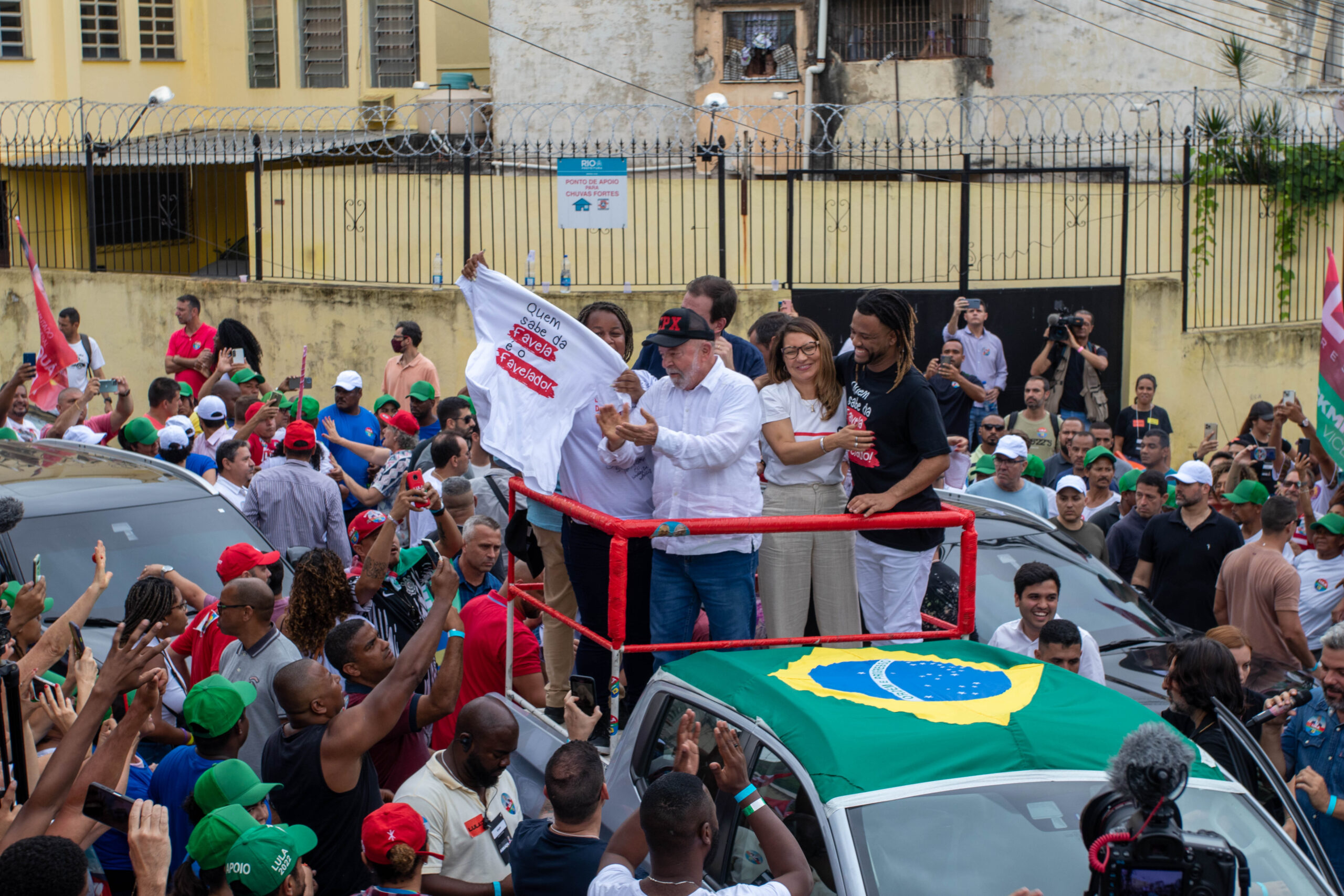
For Rene Silva—recognized as one of the 100 most influential people of African descent in 2018, and founder of internationally renowned community media site Voz das Comunidades—the fake news was circulated because of their support for President Lula in the 2022 elections:
“I positioned myself in favor of President Lula in the elections. Even before his visit to Complexo do Alemão, I was strongly showing my support on social media. But that’s not the only reason. The fact that I am a young Black man from a favela also plays a role. We end up being much more vulnerable than white people and Lula supporters from other politicized regions, you know? Because a white person is not in as much of a vulnerable position… Now, for a young Black man from a favela, historically marginalized as a place of criminals and drug traffickers, to speak up about a president, that bothers people, right?”
Who is Raull Santiago?
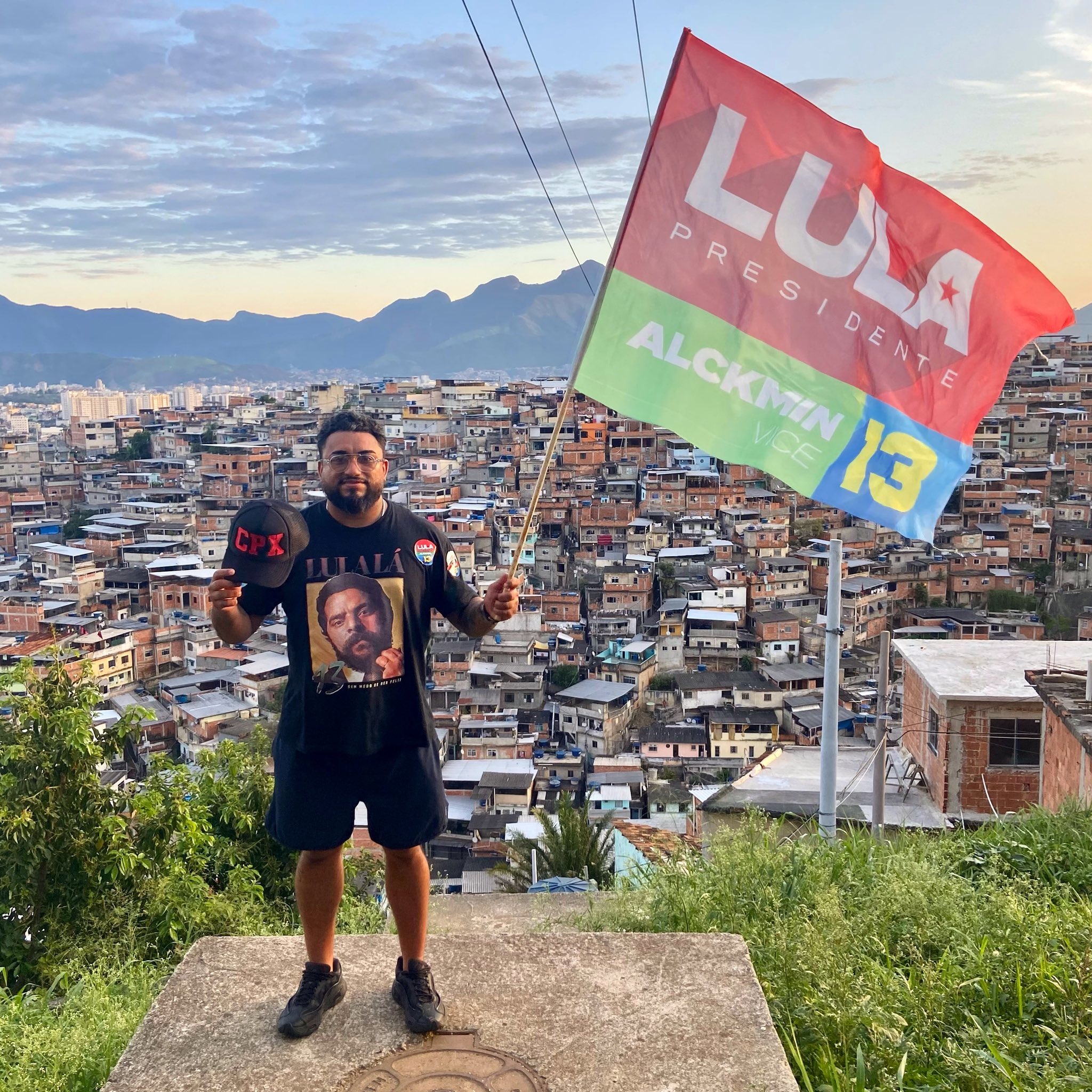
Born and raised in Complexo do Alemão, Raull Santiago is a human rights activist in Rio de Janeiro. On March 27, 2014, he co-founded the Straight Talk Collective, an independent media collective documenting life in Complexo do Alemão. Initially, the aim was to raise awareness of what was happening in the favela while the Pacifying Police Units were being set up in the area and to highlight police violence, which was being ignored by traditional media. As part of the first generation of young people in favelas with access to smartphones, Santiago uses his social media accounts, currently reaching 600,000 followers, to share his straight talk.
In an interview with RioOnWatch, Raull Santiago talked in more depth about the events leading up to his filing a complaint with the Police Station for Race Crimes and Offenses of Intolerance (DECRADI) on January 9.
RioOnWatch: Why do you think you became a target of fake news campaigns?
Raull Santiago: It’s important to establish that there is a fake news timeline… I believe that we showed up on the radar of far-right, ‘Bolsonarist,’ and fascist ideologies during the coup against Dilma, when we were already posting against authoritarian governance on social media. Bolsonaro won and we persevered, right? We took a strong stand against the perversion that Bolsonaro’s presence in our country’s presidency signified. Then the [2022] elections came and we blew up on their radar when Lula came to Complexo do Alemão, right? Even more so when Hector [an organizer with Voz das Comunidades] handed a CPX baseball cap to Camila Moradia, a community leader in the fight for housing in Complexo do Alemão, which she put on Lula’s head. The cap went viral at the end of the second round of elections, as fake news. The CPX acronym was accused of being crime-related, which criminalized not only us in Complexo do Alemão, but all of Brazil’s urban peripheries and favelas. Even the Pacifying Police Units in Complexo do Alemão and Complexo da Penha use the CPX abbreviation for “Complexo.” We residents use CPX as a reference for where we live.
RioOnWatch: When were you informed of the fake news, and how many cases were there?
Raull Santiago: We faced a lot of backlash before and after the 2022 elections. I think this wave has been growing. First, we showed up on the radar of these extreme-right Bolsonaro supporters who have very archaic beliefs. And all of this culminated in the recent fake news stories that sadly assert my involvement [with drug trafficking]. The fake news began to spread the day after the acts in Brasília. I found out when they started to be posted by various people on my social media feeds, especially Twitter and Instagram, who were tagging me and showing me what was going on… that they were putting my face in the middle of those terrorist and vandal acts, associating me with those images.
RioOnWatch: The criminal complaint you registered was for race crimes. Why did you opt for presenting a criminal complaint, as well as reporting the fake news?
Raull Santiago: We reported this as a race crime because we are very concerned about the images of our friends. It’s clear that they were being associated with this situation just because they are young Black men living in a favela. There was also the case where at the presidential inauguration, I was, strategically, confused [on fake news threads] for and treated as security and not as someone invited to attend. So, first we reported our case at the Police Station for Race Crimes and Offenses of Intolerance. We prepared a file to make another complaint at the office specialized in Internet crimes. We identified many of the people who were sharing the fake news.
RioOnWatch: Since showing your support for President Lula in the 2022 elections, you and Rene Silva have been targets of fake news. Do you believe that this process is due to the criminalization of poverty? What is your biggest fear or apprehension when it comes to the spreading of fake news?
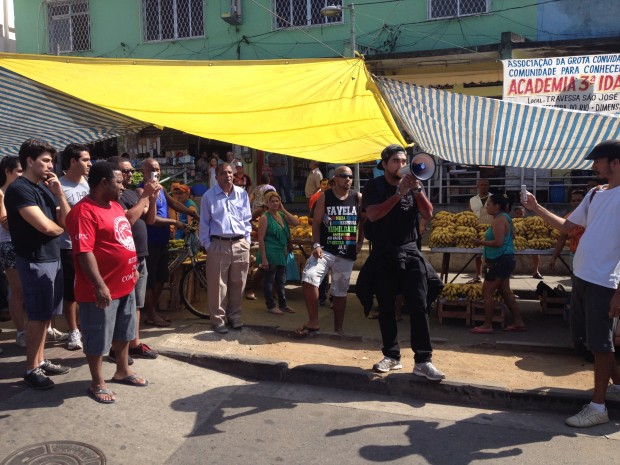
Raull Santiago: I’m sure that’s the case. A previously timid Brazil has now been exposed. Previously hidden, it showed its colors during the Bolsonaro period. It’s a fascist, far-right-thinking, white supremacist Brazil that longs for financial supremacy over Black and poor people. I think this has really come to light in the last four years of Bolsonaro’s government. For them, people like Rene Silva and I, who became close to Lula and first lady Janja in this election cycle, are only good to be structural targets and not protagonists. I think this feeling is personified by us, by Camila Moradia, and so many other [Black] people. It’s the face of this racist elite, that loathes young Black people wearing baseball caps and dreads, who use slang to talk and have tattoos. It’s this whole process… the materialization of a process where the elite look at us with discrimination and criminalization… This is certainly one of the processes that make us a target, right? But look, unfortunately this isn’t the first time I’ve been the target of fake news. My fear, for example, in the recent fake news about the vandalism in Brasília, had to do with the guys that were in one of the photos with me. Like it or not, I have social media accounts with many followers and direct contact with national and international media that continue to help me, letting people know that the news is fake, explaining and helping spread this counternarrative. But I was worried about the other young Black men, especially because they do a lot of work out in the community. The guys were my biggest worry. But we talked a lot, reported these cases together, filed the police report, also for our own safety. We did this as a security tool, to shield ourselves in case we were directly faced with a violent situation and it turned into something physical.
About the author: Tatiana Lima is a journalist and popular communicator at heart. A Black feminist, member of Complexo do Alemão’s Researchers in Movement Study Group, she is currently special reporter with RioOnWatch. A fair-skinned Black woman, born and raised in a favela, Lima currently lives in Rio’s periphery and is a doctoral student at the Fluminense Federal University (UFF).
About the artist: Rodrigo Cândido is an illustrator and comics artist, whose focus is to put black people in every imaginable narrative. His work has influences of Afrofuturism, games, music, and the history of great black men and women who have shaped humanity.
